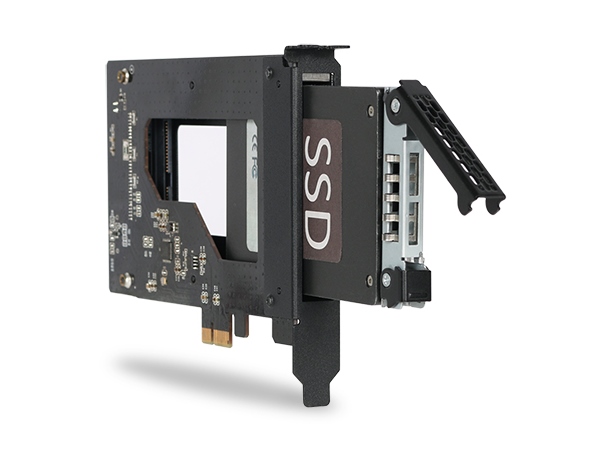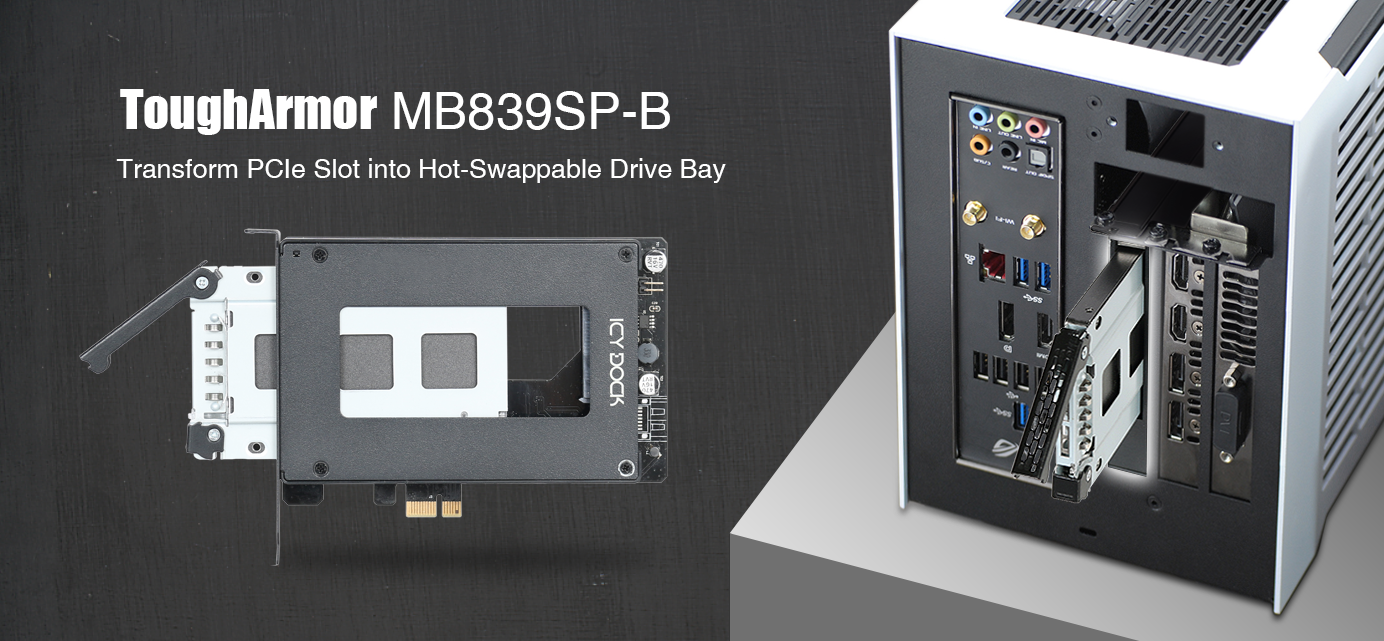Shove 2.5-Inch Storage Into PCIe Expansion Slots With This Adapter
Icy Dock's MB839SP-B is a quirky use for leftover expansion slots.

As Nvidia SLI and AMD Crossfire multi-graphics card systems are losing popularity, we've been wondering what to do with all the spare expansion slots in our full-size ATX PCs. Icy Dock had the same thought, as they just introduced the MB839SP-B adapter last week, as spotted by Hermitage Akihabara.
The adapter turns a PCIe 1x expansion slot into a hot-swappable 2.5-inch drive bay for SATA drives. This means that you'll be able to swap in your 2.5-inch hard drives and SSDs without needing to reboot the system.
- The best SSDs for your PC
- The best external hard drives and SSDs of 2020
This can be a great solution in a handful of situations, such as a lack of 2.5-inch drive mounts in small PC cases or if you've run out of SATA ports on your motherboard. The adapter also comes with its own onboard SATA controller, and the ports are rated for up to 10,000 insertions. The company was even thorough enough to include two pins that let you connect the unit to your case's front HDD activity LED.
Icy Dock's new adapter can be plugged into all PCIe ports ranging from PCIe 2.0 x1 slots up to PCIe 4.0 x16 slots, not that it will make a difference to the bandwidth: all are limited to the speed of the internal SATA interface, which caps out at about 500 MBps with fast SSDs installed. Nevertheless, if you have an old system with only SATA II ports, this device is helpful for making the jump to SATA III speeds on one drive.
We spotted the Icy Dock MB839SP-B on Amazon for a steep $65.
Get Tom's Hardware's best news and in-depth reviews, straight to your inbox.
Niels Broekhuijsen is a Contributing Writer for Tom's Hardware US. He reviews cases, water cooling and pc builds.
-
justin.m.beauvais This is interesting. I can think of a few instances where it might be useful, but in most of those a more elegant solution exists. Now something like this in an older PCI slot would be amazing for a retro gaming PC. It would make a lot more sense than a compact flash or SD solution. You could pretty cheaply shove a 32GB SSD in there and have a ton of storage for Windows 98 and whatever games you wanted. It could also make sense for a very clean looking modern PC. No need to cable manage drive cables if there are no cables. I kind of like the idea.Reply -
Newtonius Replyjustin.m.beauvais said:This is interesting. I can think of a few instances where it might be useful, but in most of those a more elegant solution exists. Now something like this in an older PCI slot would be amazing for a retro gaming PC. It would make a lot more sense than a compact flash or SD solution. You could pretty cheaply shove a 32GB SSD in there and have a ton of storage for Windows 98 and whatever games you wanted. It could also make sense for a very clean looking modern PC. No need to cable manage drive cables if there are no cables. I kind of like the idea.
What kind 'elegant solutions' are you talking about?
I really like the look and design of this, might even get one for my server, but if you know something better pray tell. -
justin.m.beauvais Reply
M.2 in most instances is a more elegant solution. A PCI-E M.2 adapter card costs less and takes up less space. Add to that the availability of small form factor solutions and M.2 is a better format. Sure, I'd probably rather have this for older 2.5" drives, but not many people have those just sitting around, but a USB adapter is a lot cheaper. The problem with this is that if doesn't have a small form factor version. If it did it'd be AMAZING for smaller computers that are limited in the drives they can hold by their size, but M.2 works there too, in new systems anyways.Newtonius said:What kind 'elegant solutions' are you talking about?
I really like the look and design of this, might even get one for my server, but if you know something better pray tell.
Yes, there are a few solutions where this makes more sense, especially if we are talking about adding onto older hardware, but for the price of this plus drive, a 1TB M.2 makes more sense than this plus a 1TB 2.5" HDD. The M.2 solution would be a lot faster too. With 2TB drives this solution is good, for anything 1TB or smaller M.2 makes a lot more sense... and if we are honest there aren't many, if any, 2.5" x 9.5mm drives over 2TB. -
cryoburner It seems a bit expensive for what it does. It's possible to find similar PCIe cards on Amazon that support a pair of M.2 NVMe drives on an x4 slot for under $20. They might not be "name brand", but they seem to have decent reviews and should allow for higher performance when paired with NVMe drives, and a small form-factor design.Reply
I suppose one of these could potentially be useful if you want to use the hot swap functionality, but the rear of the case doesn't exactly seem like the most convenient location for a hot-swap bay. -
Newtonius Replyjustin.m.beauvais said:M.2 in most instances is a more elegant solution. A PCI-E M.2 adapter card costs less and takes up less space. Add to that the availability of small form factor solutions and M.2 is a better format. Sure, I'd probably rather have this for older 2.5" drives, but not many people have those just sitting around, but a USB adapter is a lot cheaper. The problem with this is that if doesn't have a small form factor version. If it did it'd be AMAZING for smaller computers that are limited in the drives they can hold by their size, but M.2 works there too, in new systems anyways.
Yes, there are a few solutions where this makes more sense, especially if we are talking about adding onto older hardware, but for the price of this plus drive, a 1TB M.2 makes more sense than this plus a 1TB 2.5" HDD. The M.2 solution would be a lot faster too. With 2TB drives this solution is good, for anything 1TB or smaller M.2 makes a lot more sense... and if we are honest there aren't many, if any, 2.5" x 9.5mm drives over 2TB.
I see what you mean and I completely agree, this does seem more practical for 2TB or more 2.5" SSD's for the prices compared to a 2TB m.2. And if you look in my signature I have such the scenario ;). Thus this is a really attractive idea for me. Nothing gets my technical juices flowing like hotswapping drives whenever I want.
But beyond just a general user based scenario this is also useful in configurations for people who troubleshoot drives and need to constantly swap them out to troubleshoot, clone, or even backup data quickly to multiple drives. That was my main excitement about this, the many practical uses because of the removal of SATA and PSU cables. -
TechLurker This would be perfect to hide behind a vertically-mounted GPU, in cases that do support a vertically-mounted GPU from the start (most add on adapters prevent the use of any other slots). Just route the ribbon cable over this card and into the 1st x16 slot.Reply
True, a generic NVMe PCIe card might be cheaper, but NVMEs are still more expensive compared to standard 3.5" SSDs at 2TB or more. And if one is mostly using them more as a storage drive or general-purpose drive, this could be a cheaper option. There is also the bonus of being able to take the 3.5" drive out and pop it into a portable case when on the go for extended periods, and popping it back in when at the house. -
dummyme I rather buying a SATA to USB3.1 adaptor instead, at least it's cheaper (less than $20), support faster speed (in theory), and also portable (can attach to other devices easily, such as laptop, nas, etc.)Reply -
Chung Leong Replycryoburner said:I suppose one of these could potentially be useful if you want to use the hot swap functionality, but the rear of the case doesn't exactly seem like the most convenient location for a hot-swap bay.
Yeah. This thing only makes sense if you have a SFF case with no external drive bays. Really niche market.

